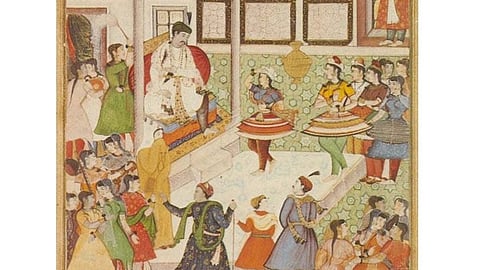Nawab Wajid Ali Shah — the great patron of arts who nurtured Lucknow's Kathak Gharana & Thumri
Do you know about the origins of classical music forms like Kathak and Thumri? We're well acquainted with the fact that these rich cultural forms found their roots in the Awadhi soil, but do we know the intricacies of the same?
Written in golden letters is the name of the last ruler of Lucknow, Nawab Wajid Ali Shah, when it comes to performing arts like dance, music and poetry. A skilled Kathak dancer and a prolific composer, Nawab Wajid Ali Shah wrote some 40 compositions in prose, poetry and Thumris.
The Man, the Myth, the Legend: Nawab Wajid Ali Shah
Every Lucknowite, at least once in their lifetime, has felt the innate pride when the name of Begum Hazrat Mahal was chanted. Nawab Wajid Ali Shah's second wife, the queen and regent rose against British during the Rebellion of 1857 and became a puissant symbol of resistance against the foreign forces. Even though the Nawab was tragically exiled in 1856 as East India Company annexed his kingdom, he ruled for almost 9 years and made note-worthy contributions during his reign from 1847 to 1856 — most significantly as a seminal patron of arts.
Having garnered vocal training under renowned Ustads like Basit Khan, Jaffar Khan and Pyar Khan, Shah was also referred to as “Akhtarpiya” (meaning 'beloved star'). It was under this penname that he produced many compositions. He also received Kathak training under Bindadin Maharaj and Thakur Prasadji.
Often considered a literary genius, the Nawab produced long devotional-romantic poems and narrated his own story in verse when he was in his 20s. His books like 'Husn-e-Akhtar' and 'Diwani-Akhtar' also comprise some of his magnificent Ghazals. Notably, Shah wrote rich Ragas like Juhi, Jogi and Shah-Pasand. The patron of music is also known to have cultivated the Lucknow Gharana of Kathak. As per popular belief, Wajid Ali Shah is known to have created the light classical music form of Thumri. Moreover, the Nawab offered his patronage to numerous eminent poets and scholars, including Mirza Ghalib, Ahmad Mirza Sabir, Agha Hasan Amanat and Mufti Munshi.
Thus leaving behind an indelible imprint and a legacy in these cultural assets, Nawab Wajid Ali Shah made remarkable contributions to Hindustani art and literature.
To get all the latest content, download our mobile application. Available for both iOS & Android devices.

